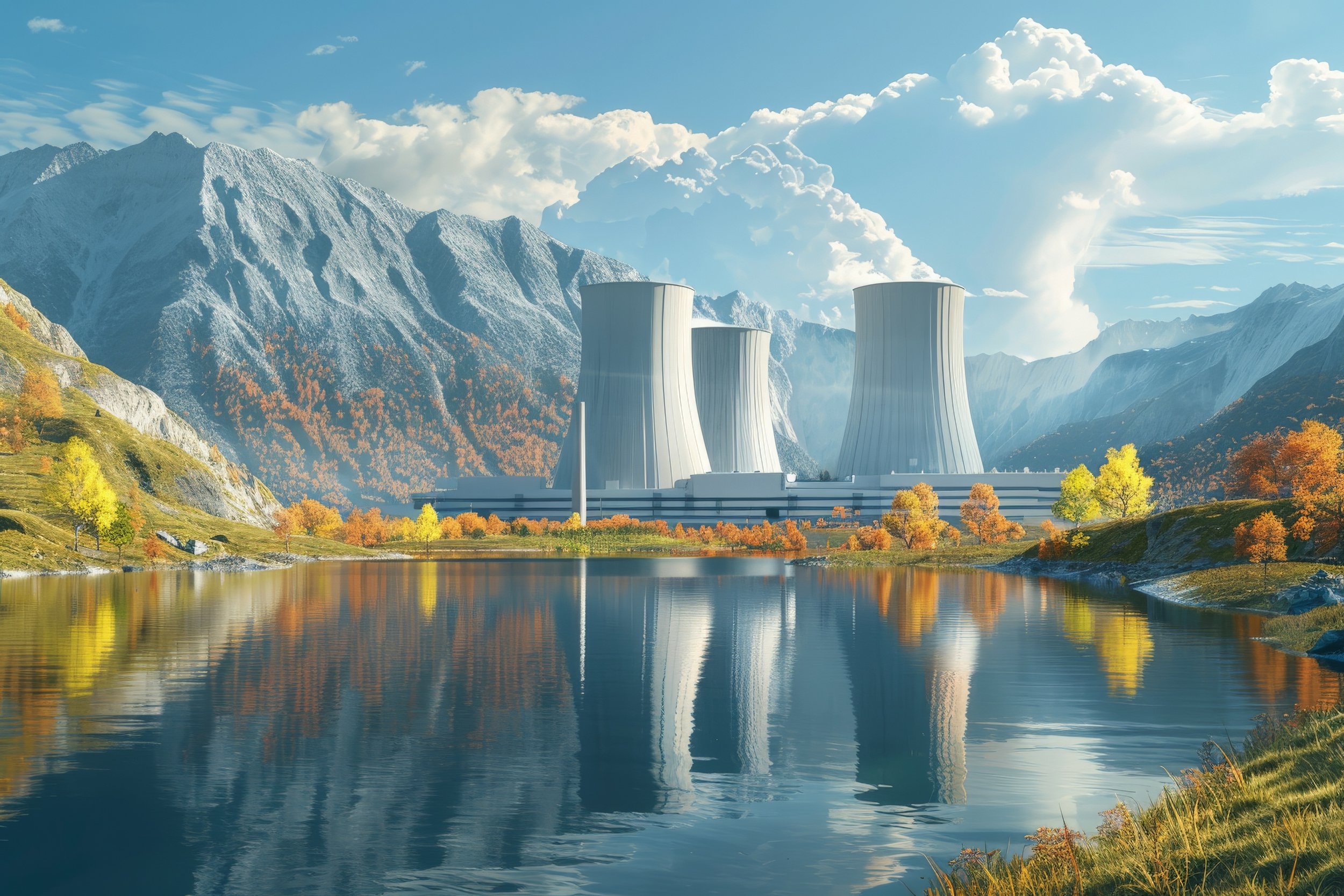Nuclear Buzz: The Electrifying Debate on Nuclear Energy
Welcome to the fascinating topic of nuclear energy! With the Oscar-winning success of the movie Oppenheimer, public interest in this complex and controversial subject has been renewed. Nuclear energy is like a superhero, producing massive amounts of clean energy with zero carbon emissions, making it a champion in the fight against climate change. It operates with incredible efficiency and reliability, generating electricity around the clock, unlike solar and wind which depend on weather conditions. However, every superhero has its weaknesses, and nuclear energy is no exception. It produces hazardous radioactive waste, requires a big cost, quite sometime to build, and has a dark past of significant accidents - Chernobyl and Fukushima. There is also a real concern of nuclear proliferation, and the potential for devastating environmental impact. But let’s not get ahead of ourselves, first off what is nuclear energy? Let’s nerd out on the process before we delve into the debate.
Sun Inspired
Any conversation pertaining to nuclear energy should give a big tip of the hat to humankind’s greatest ally…our sun. Studying the sun helped scientists understand nuclear energy. The sun's energy is produced through nuclear fusion, where hydrogen atoms combine to form helium, releasing vast amounts of energy. This process inspired scientists to explore nuclear reactions on Earth. While nuclear power plants use fission (splitting atoms) rather than fusion, the principles of nuclear reactions and the immense energy potential they demonstrated in the sun provided a crucial foundation for developing nuclear energy technology. Nuclear energy is like harnessing the power of the atom's core. This energy heats water into steam, which then spins turbines to generate electricity. Think of it as a super-efficient steam engine running 24/7, unaffected by weather. While it's a clean and powerful energy source, producing no greenhouse gases during operation, it also generates radioactive waste that must be carefully managed for thousands of years.
Why Should We Care?
Any topic that is as hotly contested on both sides is worthy of exploration. As inhabitants of this miraculous planet, humankind should care about nuclear energy because it offers a powerful solution to generate large amounts of electricity with minimal greenhouse gas emissions, helping combat climate change in ways like no other. Unlike fossil fuels, nuclear energy can provide a steady and reliable energy supply. Balancing these benefits and risks is crucial as we seek sustainable and clean energy sources for the future. In every great debate, examining the benefits and disadvantages is key to understanding how to make these critical decisions. Let’s start our fascinating exploration by looking at the advantages:
PROS
Zero Greenhouse Gas Emissions
Nuclear energy is a low-carbon source of electricity, producing no greenhouse gas emissions during operation. Contrary to what many believe, cooling towers in nuclear plants only emit water vapor and are thus, not releasing any pollutant or radioactive substance into the atmosphere. The European Commission took a clear stance on nuclear power by labeling it a green source of energy in its classification system establishing a list of environmentally sustainable economic activities.
Reliability
Nuclear power plants can operate continuously, providing a reliable source of energy. Unlike fossil fuels that need constant refueling or wind and solar that vary on weather, nuclear power plants can operate consistently for up to two years before needing to refuel due to the high energy density of nuclear fuel, specifically uranium. This is three times more reliable than solar.
Low Operating Cost
Once built, there is very low maintenance with a high capacity. The operating costs of nuclear energy primarily include fuel costs (uranium), operations and maintenance (plant staff, routine maintenance and regulatory compliance), and waste management. Waste management costs involve the safe handling and storage of radioactive waste. While building nuclear plants is expensive, their operational costs can be lower than fossil fuel plants over time due to the long intervals between refueling and the high reliability of nuclear reactors.
Scalability
Scalability in nuclear energy power plants refers to the ability to adjust and expand the technology to meet varying energy demands. Traditional large-scale reactors can provide massive amounts of power, ideal for meeting the needs of large grids. However, newer advancements like small modular reactors (SMRs) offer flexibility. SMRs can be built incrementally, added as needed, and deployed in remote locations or smaller grids. This modular approach allows for gradual investment, easier financing, and the ability to adapt to changing energy needs and technological advancements.
Fast Decarbonization
Decarbonization is crucial for mitigating climate change by reducing greenhouse gas emissions. This process helps limit global warming, protecting ecosystems, and preventing extreme weather events, sea-level rise, and biodiversity loss. Many nuclear energy supporters argue that nuclear power is responsible for the fastest decarbonization effort in history, with big nuclear players like France, Saudi Arabia, Canada, and South Korea being among the countries that recorded the fastest decline in carbon intensity and experienced a clean energy transition by building nuclear reactors. Additionally, nuclear energy is generally considered safer than fossil fuels in terms of public health and environmental impact. While nuclear accidents can be catastrophic, they are extremely rare. In contrast, fossil fuel pollution causes millions of deaths annually due to air quality issues, contributing to respiratory and cardiovascular diseases.
CONS
High Initial Investment
Building a nuclear power plant requires a significant initial investment. Nuclear plants are expensive to build and they take much longer than any other infrastructure for renewable energy. The long building process is considered a significant obstacle in the run to net-zero emissions that countries around the world have committed to if they hope to meet their emission reduction targets in time. Restarting dormant nuclear power plants are an alternative to beginning from scratch.
Nuclear Waste Disposal
Radioactive nuclear waste contains highly poisonous chemicals like plutonium and the uranium pellets used as fuel. These materials can be extremely toxic for tens of thousands of years and for this reason, they need to be meticulously and permanently disposed of. Since the 1950s, a stockpile of 250,000 tonnes of highly radioactive nuclear waste has been accumulated and distributed across the world, with 90,000 metric tons stored in the US alone. Knowing the dangers of nuclear waste, many oppose nuclear energy for fears of accidents, despite these being extremely unlikely to happen.
Risk of Accidents
Nuclear power plants can be hazardous, as accidents like Chernobyl and Fukushima have shown. The potential danger from an accident at a nuclear power plant is exposure to radiation. The Chernobyl disaster killed 30 people, with another estimated 30 deaths involved indirectly through radiation induced cancer. While the Fukushima disaster did not kill anyone directly, it did lead to the displacement of more than 150,000 people and billions of dollars spent on cleanup. There was a near miss during the 3 Mile Island incident where a cooling malfunction caused part of the core to melt in Reactor 2. Some radioactive gas was released but not enough to cause adverse health effects, as noted in numerous health studies. Although these types of accidents are rare, the risk of an accident occurring gives skeptics fodder for concern.
Proliferation Risk
The most talked about disadvantage of nuclear energy is the nuclear weapon proliferation. In 1970’s, the Treaty on the Non-Proliferation of Nuclear Weapons entered into force. Its objective was to prevent the spread of such weapons to eventually achieve nuclear disarmament as well as promote peaceful uses of nuclear energy. Opposers of this energy source still see nuclear energy as being deeply intertwined with nuclear weapons technologies and believe that, with nuclear technologies becoming globally available, they believe the risk of them falling into the wrong hands is high.
What Will Happen
The nuclear energy debate is set to become even more electrifying, driven by cutting-edge innovations like small modular reactors, promising unprecedented safety and efficiency. The race to combat climate change will crank up the demand for low-carbon energy, putting nuclear power in the spotlight. Government policies and regulatory moves will be game-changers, with supportive measures potentially speeding up its adoption. Economic factors, public opinion, and global cooperation will play pivotal roles. As countries chase energy security and independence, nuclear energy's appeal will soar, especially for those with limited renewable resources. This dynamic debate will be shaped by a thrilling mix of technological, environmental, economic, and social forces. Regardless of which end of the spectrum your opinion is on, this is definitely a hot topic that will be exciting to watch how it evolves! What are your thoughts on nuclear energy? Please leave a comment below!





